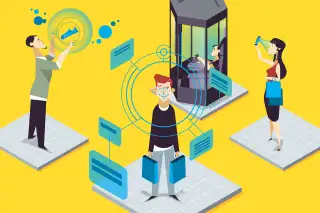4 Futuristic Features Every Retail Store Will Have by 2025

This fall, Nordstrom opened a new store in West Hollywood, Calif., called Nordstrom Local, that didn't actually stock clothes you can buy. Instead, you can get manicures, try on clothes, talk to stylists and consultants about fashion, and meet with friends over coffee or perhaps a glass of Pinot Grigio (yes, there's a bar). If you want to buy something, it'll be available for same-day pickup or delivery.
As bizarre as the concept might seem, it's likely a glimpse into the way many stores will soon function. Forward-thinking retail experts say that over the next decade or so the act of physical shopping will transform in two key ways. One, shopping will become more of an entertaining experience for trying out new products and services rather than a repetitive chore for purchasing and picking up things to bring home. And two, every shopping hassle that can be eliminated, from long customer service lines to frustrating searches for items that are sold out, will be eliminated.
Here are just a few of the features that are coming in the not-so-distant future. George Jetson would be proud.
Eye Pay
Get ready to say goodbye to checkout waits, and you probably won't ever need cash, credit cards, or even a wallet or smartphone. Retail prototypes like the Amazon Go store in Seattle show where things are headed by dramatically increasing convenience, with payments made via a virtual shopping cart rather than an old-fashioned checkout line.
Jim Carroll, a renowned futurist, says that within 10 years, stores will be capable of accepting payments with a retina scan or thumbprint.
And your car could be your wallet for that next run to the drive-thru liquor store or burger joint too.
"Your vehicle will basically turn into a credit card," he says. "It will be authenticated in advance, and you'll be charged automatically when you go through the drive-thru." Depending on how driverless car technology progresses, you might not even need to be behind the wheel when the transaction happens—but if you spill some ketchup, that's still on you.
Love for the Haters
So-called husband pods opened this year at a mall in China, allowing bored dudes to zone out with video games in glass enclosures rather than be dragged around to clothing stores. Weird? Yes. But it's also a great example of what retailers and malls are doing with the knowledge that the act of physically going shopping is rarely a necessity nowadays—and that some people actually hate doing it.
Expect more events and nonshopping distractions to give even the haters a reason to show up in shopping centers—a term that may soon be a misnomer, says Doug Stephens, author of Reengineering Retail: The Future of Selling in a Post-Digital World.
"Today, 70% of mall space is dedicated to retailers, and most of them are selling apparel," he says. "The whole model will shift, and down the line 30% of the space will be for shopping, while 70% will be dedicated to food, entertainment, lifestyle, and community activities."
Stores That Recognize You
Retailers have been trying to merge online and in-store operations for years, and the full synchronization of the two experiences will soon be at hand. This means that in the same way a website knows who you are when you're shopping online, physical stores will identify you in the aisles via facial recognition and retrieve your browsing and purchase history instantly.
Sure, that's creepy, but the upside is, because the store knows what you like, it might offer pop-up discounts on your favorite products or free samples. You'll also have the same benefits of online shopping, like one-click purchasing, easy free shipping, and endless information like price comparisons and product history from touch screens or voice command.
The options for what you can buy will be limitless too. "You'll be able to rapidly search everything a store sells and find or customize the exact thing you want," says Stephens, who uses the term "living websites" to describe stores of the near future.
Stores won't be restricted by what they happen to have in stock or even by what manufacturers produce. Take running shoes: In the future there will be no restrictions on what size, color, and style of sneaker you can purchase. "A scan of your foot will be sent to a 3D printer, and it'll make customized footwear on the spot," Carroll says.
Try Before You Buy
Retailers will shift to encouraging consumers to interact with products—to explore and play—with the idea this will result in sales in the long run. Last year, Samsung opened a 40,000-square-foot "immersive cultural center" in New York City that doesn't stock any products for sale. Instead, it boasts a three-story wall of digital screens, a multimedia studio, and a demo kitchen designed for showing off things like smart appliances. It welcomes the public by hosting parties, movie screenings, book signings, and talks by people like wine industry entrepreneur Gary Vaynerchuk.
Customers of the future will also be able to see, try on, and even feel clothing in any style, size, color, and fabric imaginable, thanks to biometric scans and augmented reality. And this won't necessarily have to take place in a store. "With virtual reality, you'll be able to sit behind the wheel of a Mercedes in your living room—to literally feel what it's like driving it," says Stephens. "You could virtually visit a hotel room you're thinking of booking or walk around in a restaurant too."